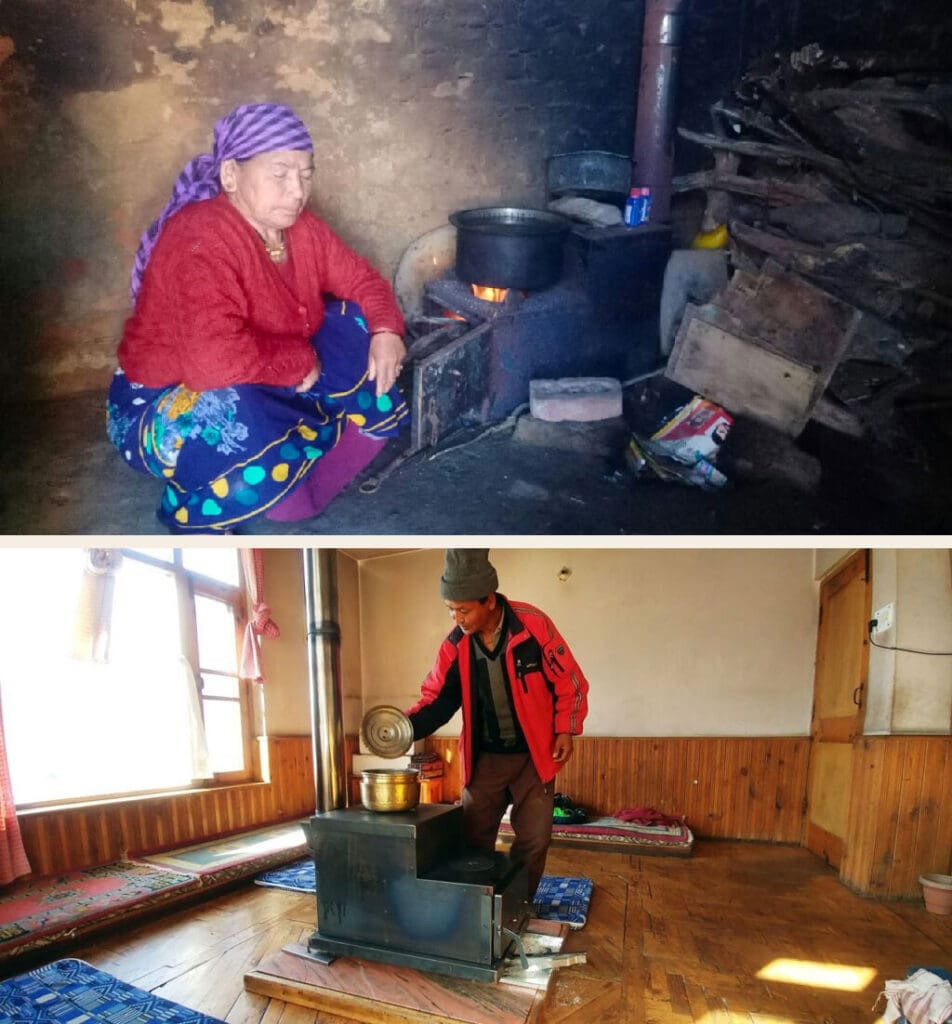Integrated Heating and Cooking Stoves - Himalayas
Life in the high-altitude and remote Himalayas of India is a combination of difficult terrain, harsh cold climates and poor access and connectivity, even for basic necessities. The most fundamental need in these regions is warmth and eat to survive the harsh winters, which bring extreme sub zero temperatures. Most households in this region rely on biomass, fuelwood or charcoal for space heating and cooking.
The lack of accessible and affordable modern energy solutions for communities in these regions is causing deforestation, land degradation, high CO2 emissions, as well as adverse health impacts due to long exposures to indoor air pollutants and collection related drudgeries throughout the year.
The Indian Himalayan region relies on firewood for heating and cooking throughout the year. It is estimated that each household consumes between 1500-4000 kg of firewood in a year.
Phunchok Tandup’s household is a family of four, living in Tabo, a village nestled at 3250m in Lahaul, Spiti, Himachal Pradesh, with limited access by motorable roads. The family rely on agriculture for income and earn upto Rs. 1 lakh (1250 USD) in a year. In the past, they had a traditional tandoor in their living room and used a mixture of wood and kerosene as fuel from October to March every year. During the winter months they used the tandoor for nearly 8 hours a day, for warmth, cooking, and heating water, consuming at least 10 kg of biomass daily. The family, like most other families in the region, does not own sufficient farmland for collection of firewood or other biomass for their energy equirements, and purchase firewood from the Forest Department of India, spending atleast Rs. 1800 in a month, and over Rs. 10,000 for heating during winter months.
The HRS Eco-mini integrated stoves are designed to address both heating and cooking needs, optimising the heat generated for thermal comfort, improving combustion and reducing firewood consumption and emissions. Phunchok Tandup’s family is one of the 2000 households using the Eco-mini. They purchased it in January 2021, by paying an upfront instalment of Rs. 3000 and the remaining over the next 6 months. The flexibility in payment made the solution affordable and it’s effectiveness has led to a complete shift away from the traditional tandoor.
The family relies on the Eco-mini to meet their heating requirements, and also uses it to cook meals, boil water, make tea / coffee. Installed in the space common to the living room and kitchen – it serves the dual purpose of a heating as well as cooking device. In addition to zero smoke emission indoors, the Eco-mini heats the space in fifteen minutes and keeps it warmer for longer in comparison to the tandoor.
The stove has nearly halved the fuelwood consumption from over 250kg to 150kg a month, leading to monthly savings of Rs.1200.
Families in other regions, like Ladakh, also have similar space heating and cooking requirements, for which they spend 3-4 hours a week gathering fuelwood and animal dung from their own farm or neighbouring farms to use as fuel in the bukharis.
Customized to the unique needs of the region, bukharis are traditional wood-burning heating stoves that vent outdoors via a fuel pipe. They are extremely fuel inefficient (15%); the wood in the bukhari burns fast and it loses most of its heat to the atmosphere outside through the fuel pipes. It has also been known to cause burns, accidents and other injuries, being unsafe especially for children. Several families in the region have adopted the Eco-mini and prefer using
it for space heating, water boiling and other small cooking needs. They report an improvement in fuel efficiency and a reduced requirement for biomass.
Sustain Plus and HRS are working towards enabling 2000 households and micro-enterprises across Ladakh, Himachal Pradesh, Uttarakhand, and Darjeeling to access an efficient and affordable clean cooking cum space heating solution.

